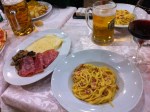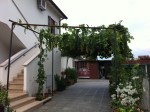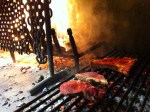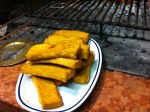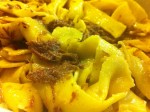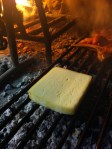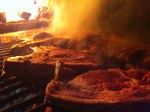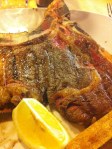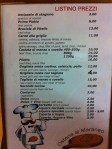By Alex Meehan. First published in The Sunday Business Post, February 17th, 2013.
“We don’t question the provenance of our food enough and how meat, chicken and fish find their way into the food chain has become no more controversial than how, say, a tin of beans or a loaf of sliced bread is made and that’s not right.”
 Sitting down to chat with Hugh Fearnley-Whittingstall is never boring. A fervent believer in the role of good food in the lives of healthy people, he’s just at home talking about lightweight projects like his Three Good Things book as he is talking about complex food politics.
Sitting down to chat with Hugh Fearnley-Whittingstall is never boring. A fervent believer in the role of good food in the lives of healthy people, he’s just at home talking about lightweight projects like his Three Good Things book as he is talking about complex food politics.
With over 21 cookbooks, multiple TV series, two restaurants and a cookery school to his name, the predominantly self-taught cook has pulled off one of the most difficult transitions in television – from light entertainment to current affairs.
His campaigning efforts to engage the public in the politics of food have forced supermarket chains to sit up and take notice and in the process, he’s become the poster boy for food with a social conscience. His efforts have focussed the public’s awareness on the importance of traceability, ethics and sustainability in the food chain.
With the horse meat scandal fresh in the memories of Irish consumers, it seems his ideas are as timely as ever.
“The big problem with our relationship with our food is that it’s changed so much. The industrialisation of meat production and the commodification of meat has turned it from something that is precious into processed product that we take for granted when really we shouldn’t,” he says.
The uneasy relationships that exist where big business and consumer interests collide has been a rich source of inspiration for Fearnley-Whittingstall. His campaigns have seen him take on the poultry industry in his Chicken Out TV series, while his Fish Fight series looked at the EU-driven directive that obliged fishermen to discard huge amounts of fish.
These efforts have brought the TV cook to a new kind of audience. But at the same time, it’s opened him up to a barrage of criticism.
 “There are some questions that just asking can make you very unpopular,” he says. “But there’s a huge ethical dimension to eating meat, and that’s something I’ve tried to confront head on.
“There are some questions that just asking can make you very unpopular,” he says. “But there’s a huge ethical dimension to eating meat, and that’s something I’ve tried to confront head on.
The Chicken Out programme focussed on the plight of intensively farmed chickens and ultimately resulted in modest but significant changes in the percentage of free range chickens offered for sale in Ireland and the UK.
“That campaign certainly annoyed some people and they’ve had a fairly easy comeback — ‘who’s he to tell us what to eat? He’s a posh boy who’s made lots of money from his TV shows and books — he can afford to eat what he likes.’.”
“There are a couple of ways to answer that argument. The first is that I don’t think I’ve ever told people what to eat. All I’ve really tried to do is tell people how their food is being produced and then they can make the decision about whether they want to eat it or not,” he says.
“People will also sometimes say that factory farming is here to stay because we need cheap meat. Well, I’m afraid we patently don’t — vegetarianism is an option.”
Critics of the cook say that arguing that meat production should be exclusively free range is an elitist point of view. Not everyone can afford to pay for a free range chicken, and with many families on seriously reduced budgets, intensively farmed meat is an unavoidable consequence of recessionary times.
 But Fearnley-Whittingstall feels this is a kind of straw man argument because eating ethically produced meat isn’t necessarily a matter of cost.
But Fearnley-Whittingstall feels this is a kind of straw man argument because eating ethically produced meat isn’t necessarily a matter of cost.
“You can’t duck the ethical question by defaulting to the economic argument,” he says.
“Of course, you can be accused of elitism if you can afford good meat, but meat is something I think we should only really be eating occasionally. It’s perfectly possible to eat a healthy and interesting diet that features meat occasionally rather than every day at every meal.”
“Also, it’s important to remember that it doesn’t make it okay to cause animals pain and suffering that their meat is then very cheap.”
Extrapolating out the line of thinking, he says that there may be a demand for lots of cheap meat and people willing to fulfil that demand might be able to run profitable businesses on a large scale but that doesn’t make it okay.
“In the end I guess what bothers me is that the poultry business has been a fairly secret industry. If it’s an open industry and consumers make their decisions in the full knowledge of the facts, then I’m not going to argue with them. “
“The poultry industry in particular has traditionally been very closed to scrutiny. There was barbed wire around the farms that was meant to keep people out rather than chickens in. It was very hard to get access to film – next to impossible. Luckily we were able to find some more enlightened people in the industry who were willing to let us in.”
The resulting TV show had a concrete effect on consumption patterns, proving that it’s not when it comes to food politics, things aren’t as set in stone as they might seem.
“The statistics are different now. Before the campaign less than 5 per cent of poultry purchased in supermarkets in the UK was in any meaningful sense higher welfare. Now that’s pushing 15 per cent. Not all of that is free range but there has been a particularly big jump in the amount of indoor-produced RSPCA freedom foods poultry. Also, the whole industry has been looking more at breed selection in an effort to reduce mortality.”
“What happened with that campaign is that we made a significant number of life-long converts to either free range or higher welfare forms of chicken, and maybe a few fair weather converts as well. I’m pleased with that. I’d like it to have gone a lot further – we’re still looking at 85 per cent of poultry production being intensive in nature, but we made a difference.”
Fearnley-Whittingstall’s current TV project is a follow up to his 2011 Fish Fight series, entitled Fish Fight: Save Our Seas. That series succeeded in having the wasteful discard system banned by MEPs but this time he is attempting to tackle the issue of over fishing, the lofty ambition behind the campaign is to have new areas of marine protection declared around the world in order to protect fish stocks.
At a local level, he believes Irish consumers can do their bit to help manage our seas, starting with supporting local fishermen.
“One thing we can all do is this: we’ve got to stop hammering the same old species of fish over and over again. We need to diversify our tastes and spread our consumption over a range of sustainable fish, and not keep going for cod, farmed salmon, tinned tuna and prawns,” he says.
“Those four species make up over 80 per cent of all the fish we eat and you just know that’s not right when you hear that statistic. There is no easy answer here but if you live near the coast please support your local fishermen. Buy direct whenever you can and try to buy fish that’s landed near you and try to know where your fish comes from.”
Three Good Things – on a plate is published by Bloomsbury and is in the shops now, priced €36.50, while Fish Fight: Save Our Seas started February 14th and is broadcast on Channel 4 each Thursday evening at 9pm.







